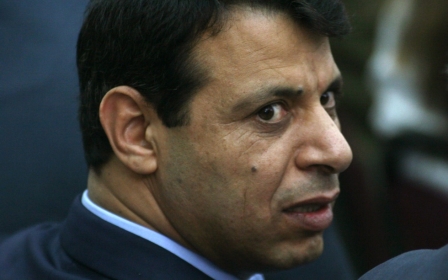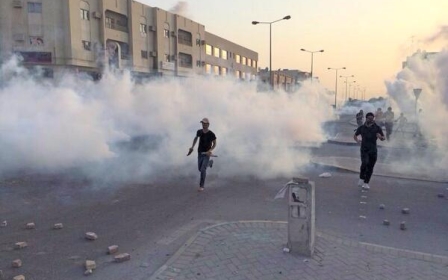Bin Zayeds are acting like spoiled kids over GCC rift

Earlier this week, in one of the more surreal acts of civil disobedience that the world has seen, a disgruntled resident of a wealthy west London neighbourhood threw an apple at a car. It was a £300,000 Lamborghini parked outside his house, loudly revving its engine.
A local newspaper rightly noted his “impeccable aim,” lofted from his fourth floor window. A video shot from a mobile phone shows the startled Arab driver leaping out and inspecting the damage to his door. The driver's face was pixelated, but given that it is August and this is London, he was undoubtedly some sort of Gulf prince.
The equally surreal phenomenon is well-established in London now, an informal parade of supercars that arrive for the same two weeks every summer from the Gulf, characterised by competitions as to who can roar their engines the loudest and the longest, all played out in the long-suffering neighbourhood of Knightsbridge, home to thousands of wealthy Arabs, Russians, and a smaller and smaller community of native Britons.
Wealthy bored Arab princes, typically vaguely related to the royal families of Saudi Arabia, Kuwait, Qatar and the United Arab Emirates, often have their Lamborghinis shipped over from the Gulf at enormous expense, then shipped back home just two weeks later. A UK TV station, has produced a recommended documentary about the trials of the local residents who endure this noisy spectacle each year typified by our apple-throwing activist.
Sadly – some of these kids may be learning their spoilt ways from their family members, who still sit in power as autocratic monarchs while democracy struggles to gain a foothold in one of the wealthiest regions on earth. There personal motivations can out-trump policy considerations - driven by a desire to stay in power, and age-old rivalries between the ruling families play out at a state-to-state level.
The worst current exhibitor of spoilt rich kid syndrome might well be the Bin Zayed rulers of the United Arab Emirates - who appear determined to undermine critical reconciliation efforts between the Gulf Co-Operation Council members and the Qatari royal family - a row which has been going on now for six months. This weekend, a summit is being held to try and reconcile Qatar with the other members of the GCC, a meeting which looks set to be tense - especially so thanks to the bullish rhetoric of the Bin Zayeds.
The spat went very public when the monarchies of Bahrain, the United Arab Emirates and Saudi Arabia dramatically withdrew their envoys from Doha, ruled by the al-Thanis, in early March. The inter-state summit that occurred the day before had broken down over the al-Thanis perceived failure to enact a security agreement agreed between the GCC states five months previously. The security pact dictated that GCC members should distance themselves from the Muslim Brotherhood, place restrictions on the cleric Shaikh Yusuf al-Qaradawi (based in Qatar and pro-Brotherhood), and severely restrict the movement of Iranian operatives within the GCC states.
The continued presence of outspoken al-Qaradawi in Doha, where he had been given access to the Al Jazeera airwaves, was particularly annoying for the ruling Bin Zayed family in the UAE, who had been singled out in one of his televised sermons as running an “un-Islamic” state. His sermons typically reach twenty million viewers across the Middle East. Nearly a hundred Islamists, connected to the Muslim Brotherhood, had also been tried and imprisoned by the Bin Zayeds.
But six months since that fateful meeting, the Muslim Brotherhood no longer pose a credible threat to the United Arab Emirates or their companions in the GCC.
Anti-Brotherhood President Sisi has now been safely installed in Cairo, shored up by billions in aid from the United Arab Emirates and Saudi Arabia, and Brotherhood members are scattered in exile, in prison or have been sentenced to death by the Egyptian judiciary.
The charge of allowing Iranian agents to travel into the GCC, while still serious - carries far less weight than it did six months ago. Events in Iraq, with the menacing rise of the Islamic State and a new and serious security risk along the northern edge of the Gulf region, have seen the GCC, led by King Abdullah, move closer to Iran. Even before then, Abu Dhabi and Dubai in particular were excited as Western sanctions were being lifted against Tehran, giving dormant trading routes across the straits a new lease of life.
Saudi Arabia was the first state to prepare a report detailing what they believed Qatar had done wrong, and King Abdullah has asked that the Qataris sign the report in order to move forward. Understandably, given no Gulf state wants to lose face on this matter, Qatar are refusing. Still, representatives of the House of al-Saud have just made a visit to the al-Thanis, in what they called a "short brotherly visit." A month previous, Emir Tamim Bin Hamad al-Thani, head of state for Qatar, visited Saudi Arabia to hold talks with King Abdullah. There is clearly intent to move things forward, on both sides. Some analysts are describing Saudi Arabia as "stepping back" from the row.
So given these events, why are the Bin Zayeds still pressing Qatar? The Abu Dhabi and Dubai state-controlled media have been fanning the flames with escalating rhetoric to discredit the al-Thanis. In July, the Zayeds ordered the arrest of three Qatari nationals on spying charges. Then they enthusiastically supported the al-Khalifa family as they accused the Qataris of fomenting sectarian tension in Bahrain.
In the summit that is currently being convened - unnamed Dubai officials told a Kuwaiti newspaper: "There are real difficulties as regards the row between Bahrain, Saudi Arabia and the United Arab Emirates on one side and Qatar on the other" warning that "the situation is likely to escalate."
All this while the Omani and Kuwaiti royals have desperately been trying to patch things up, issuing press reports that offer hope for the talks, contradicting what the bullish Bin Zayeds have been saying.
The grudges between the Bin Zayeds and al-Thanis go back a while, as the Dubai-based and state-controlled newspaper Gulf News was at pains to stress shortly after the spat blew up in March – indeed right back to the early nineteenth century. But more recently they fell out over a border clash which left two dead in 1992. A decade later, Abu Dhabi withdrew their ambassador from Doha, again over content aired on Al Jazeera. It took several years for relations to improve- but they never quite did, and clearly the tensions remain just below the surface.
And there is the wider context of Qatars foreign policy - which diverges somewhat from that of the wider Gulf Co-Operation Council with regards in support for Islamist organisations in general, including Hamas.
But the Bin Zayeds would be wise to stop acting like those spoilt young kids in Knightsbridge. There are bigger fish to fry - namely the new threat from the Islamic State. This menace will require unity from all regional neighbours if it is to be nipped in the bud. If the West are considering partnering Iran and even Bashar Assad, and the al-Sauds are open to patching things up with even their arch-rivals in Tehran, then surely the Bin Zayeds can find it in themselves to forgive the al-Thanis?
- Alastair Sloan focuses on injustice and oppression in the west, Russia and the Middle East. He contributes regularly to The Guardian, Al Jazeera and Middle East Eye. Follow Alastair's work at www.unequalmeasures.com
The views expressed in this article belong to the author and do not necessarily reflect the editorial policy of Middle East Eye.
Photo: Sheikh Mohammed bin Zayed al-Nahyan is the Crown Prince of Abu Dhabi in the UAE (Wikicommons)
Stay informed with MEE's newsletters
Sign up to get the latest alerts, insights and analysis, starting with Turkey Unpacked
Middle East Eye delivers independent and unrivalled coverage and analysis of the Middle East, North Africa and beyond. To learn more about republishing this content and the associated fees, please fill out this form. More about MEE can be found here.





